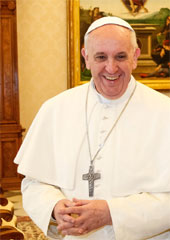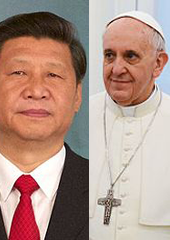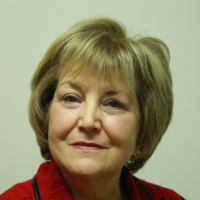The New Theology of (Global) Hope
Can Pope Francis save Venezuela’s soul?
March 26, 2014

Not since Pope John Paul II has a religious leader been looked upon so ardently as the face of hope in a turbulent world.
With global leadership faltering and multilateral organizations incapable of bringing about a resolution to conflicts, all eyes are on Rome, especially as President Obama, the politician of hope, seeks the divine intervention of Pope Francis.
On the agenda will be issues of social justice and finding solutions to the vast income inequality that still keeps a billion people in extreme poverty. In that respect, both Pope Francis and President Obama share a vision of a more just and economically secure world.
But this visit will also bring with it some realpolitik as the two leaders, one of the faithful and one of the secular free world, will certainly discuss the return of authoritarian rule in Russia with the new Czar Vladimir Putin.
But Obama may also seek Pope Francis’ intercession among his own Catholic flock in South America when they discuss a path forward in Venezuela. Violent protests, the increased shutdown of media outlets, paramilitary gang violence and an alleged coup d’état plot threatens to throw that oil-rich nation into a civil war.
Long history of papal interventions in the Americas
This last request merits some historical perspective. Papal interventions to resolve disputes and determine geographic boundaries in the Americas have their origins in the 15th century, after the discovery of the New World.
In 1493, after reports of Columbus’s discoveries had reached the Spanish crown, the royals, Ferdinand and Isabella, enlisted papal support for their claims to the New World. Their goal was to inhibit the Portuguese and other possible rival claimants from staking out ground.
It helped that the pope at the time was Spanish-born. Pope Alexander VI, based in Rome, issued bulls setting up a line of demarcation, the Tordesillas Line. It gave Spain exclusive rights to all newly discovered and undiscovered lands in the region west of the line.
Meanwhile, Portuguese expeditions were to keep to the east of the line. The Pope’s Solomonic solution was that neither power was to occupy any territory already in the hands of a Christian ruler.
Also in modern times
In 1979, a rather obscure dispute between Chile and Argentina over islands in the Beagle Channel, the passage between the Atlantic and Pacific Oceans above Cape Horn, ultimately required the intervention of Pope John Paul II. The pope as mediator resolved a potentially destabilizing military crisis.
More recently, the 2012 visit of Pope Benedict XVI to Cuba helped to reinforce the message of religious freedom as essential to Cuba’s future. Ironically, the Pope delivered his homily on the Plaza of the Revolution, the spot where Fidel had held his own rallies against the West in times past.
Such visits, done with the agreement of one of the only remaining Communist states, demonstrate the power of the church in bridging the gap between ideologies and the people.
And now in Venezuela?
With regard to the current situation in Venezuela, the key question is this: Can Pope Francis, Latin America’s first pope, lower the temperature of the rhetoric and stop the escalating violence on the streets of Venezuela that has already claimed thirty lives?
In a country where both the pro-socialist government supporters of Nicolas Maduro and pro-opposition groups are so polarized, will the good offices of the Vatican restore calm to the streets and find common ground for a national dialogue about the future of the country?
Speaking from St. Peter’s Square in late February, Pope Francis said, “I sincerely hope the violence and hostility ends as soon as possible, and that the Venezuelan people, beginning with the responsible politicians and institutions, act to foster national reconciliation through mutual forgiveness and sincere dialogue.”
No other viable choices
But why are all eyes turning to Rome to help resolve an ongoing crisis in Venezuela? The answer is simple. Multilateral organizations created to help respond to precisely these types of crises lack the capacity or the political consensus to respond.
The Organization of American States, the hemispheric body which would normally be called upon to bring the parties together, has been completely ineffective. Earlier in March, at the request of the government of Panama, the OAS held a special session to discuss events in Venezuela.
After two days of deliberation all that the body could muster was a weak statement condemning the violence, but supporting the government of President Maduro. The United States, Canada and Panama voted against the resolution.
And in mid-March, the OAS, in a special session on the crisis, prevented an opposition legislator in Venezuela’s National Assembly, Maria Corina Machado, from speaking. A resolution presented by the government of Nicaragua closed the session to the press, basically shutting down Machado’s ability to address the body. Most disappointing, however, was the support of 22 member states to operate behind closed doors.
What does intervention mean?
UNASUR, the South American Union, led by Brazil and meeting in Santiago, Chile on March 12 after the installation of President Michele Bachelet for her second term, chose to support Venezuelan President Nicolas Maduro in his attempts to bring order to his nation by holding “peace conferences” that excluded opposition leaders. This, in spite of principles agreed to in the Inter-American Democratic Charter of 2001.
This latest action of UNASUR would render that Charter obsolete, given the continued attacks on civil liberties, human rights and freedom that are occurring in countries of many of its signatories.
The language of the Charter notes two kinds of threats – those that arise from an “unconstitutional disruption of the democratic order” — and more important, those noted in Article 19 of the Charter, that are “unconstitutional alteration . . . that seriously impairs the democratic order.”
Most observers would agree that what President Maduro has done in Venezuela, following what his predecessor Chavez did, was to alter the democratic order to such an extent as to undermine certain constitutional rights without any due process.
Since the Charter’s adoption it has been invoked only two times, the first in 2002 following a coup d’état that temporarily removed President Hugo Chavez from power. The second time was in 2009 in Honduras following a successful coup against President Manuel Zelaya.
Washington as a bystander
The United States has little leverage in Venezuela, despite the important economic role that its oil plays in the political equation. In the years since former President Hugo Chavez began his Bolivarian Revolution, the United States has become far less dependent on Venezuelan oil.
Moreover, the U.S.’s relationship has been one of isolation rather than engagement. Washington has tried to move Venezuela’s civil society and the opposition, but with scant ability to really change the game on the ground.
Given the rising tide of anti-American rhetoric that has been part of the daily discourse in Caracas (President Maduro recently blamed the United States for fomenting the demonstrations and street violence), the possibility of any U.S. diplomatic efforts to end the violence would be suspect.
Enter the Vatican?
With limited options at hand, the Catholic Church may be the only honest broker available in this conflict. And this should not be surprising. Cardinal Jorge Urosa Savino of Caracas said the church was willing to help establish peace in Venezuela. He also poignantly reminded the government of its duty to rein in armed groups that are violently disrupting peaceful demonstrations.
The Roman Catholic Church in Venezuela is still regarded by most citizens to be the most trustworthy of institutions.
If Pope Francis, a man who hails from nearby Argentina, were to mediate between both sides in this Venezuelan tragedy, there may be some reason for hope that a peaceful resolution to the conflict may be possible.
As things stand, the Vatican is the only remaining mechanism the international community has to avert a deeper crisis, given the inability of the Organization of American States to demonstrate real leadership in support of democratic values and human rights.
If the Pope takes on this role, his actions will also lay bare the inability of the new region-based multilateralism a la UNASUR to become an alternate forum for solving the region’s political crises.
Takeaways
Pope Francis’s career hallmark - fighting poverty – gives him a lot of credibility in Latin America.
The Vatican actually has a long history pacifying rival forces in Latin America, going back to the late 15th century.
No party is better quipped to keep the conflict in Venezuela from escalating further than Pope Francis.
Which Latin American leader can seriously oppose Francis’s vision of a more just and economically secure world?
A successful papal intervention in Venezuela would show a constructive way forward for Latin America.
Pope Francis militates for restoring more democratic practices and seeing vital social justice goals accomplished.
Read previous

Two Shepherds, Two Cultural Revolutions?
March 26, 2014
